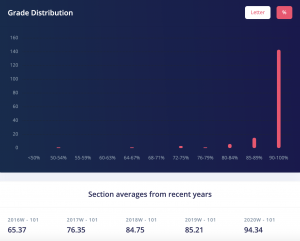Rex is a 4th year Science student specializing in Chemistry. He is particularly interested in analytical chemistry and has grown professionally from his Co-op experiences.

WHY CHEMISTRY?
Rex originally wanted to enter the UBC PharmD program, but he realized that he didn’t take the prerequisites for admission. So, at the end of first year he listed his top 3 specializations: Immunization and Microbiology, Integrated Sciences, and Chemistry.
Rex was then placed into the Chemistry program, but since chemistry students have a standard timetable, he still wasn’t able to choose the required courses for PharmD. Things didn’t seem to be going in his favour.
However, in hindsight, Rex thinks it was a good decision for him to stay in the Chemistry program, where he has had the opportunity to learn cool chemistry concepts, form good connections, and gain rich Co-op experience.
SAY YES TO CO-OP
Rex spent 12 months with the Solvay Group in Stamford, Connecticut, where he analyzed rock samples for valued minerals via X-ray fluorescence. He also worked closely with the supervisor, devising more efficient and portable methods of analyzing clay content to see if rocks were worth digging.
Not only did co-op enhance his work experience, Rex was also able to go sightseeing and explore the cities in the neighbouring state of New York every weekend. Rex reminisces on the good memories he made during his time there, and feels grateful for this rewarding experience.
This summer, Rex is working for the L.B. Foster Company, where he performs quality checks on their products. He is also developing a top secret project that we can’t wait to know about once it’s finished!
LOOKING AHEAD
Whether it is landing another job in Vancouver or pursuing a Master’s Degree at the National University of Singapore, Rex is open to options and down to go wherever the road will take him.
listen up, first years!
Rex admits that he had more of go-with-the-flow attitude in first year, and he thinks he was lucky that his path worked out. But there are aspects in his discipline that he doesn’t like and he wished he had researched more extensively beforehand.
So, his advice to incoming first year students is to begin contemplating and researching what specialization(s) they want to study, even if they have until the end of first year to select majors.
Rex also encourages thinking long-term about the job prospects. Points he would consider are: Is it employable? Is it competitive? Is it projected to grow in the future?
Lastly, Rex would like to share what a good friend once told him:
“You don’t get what you deserve in life — you get what you negotiate.”
keeping busy during quarantine
Over the past few months, Rex discovered his passion for biking, and his goal is to bike 100km in a day by the end of summer. He has also picked up reading as a hobby, and he is currently reading “The Intelligent Investor” by Benjamin Graham.
FUN FACTS
-Rex’s favourite food is a plain old cheese pizza, or a classic margherita pizza.
-As for his favourite study spot on campus, you’ll most likely find him with his friends in the Walter Gage lobby or ballroom.






